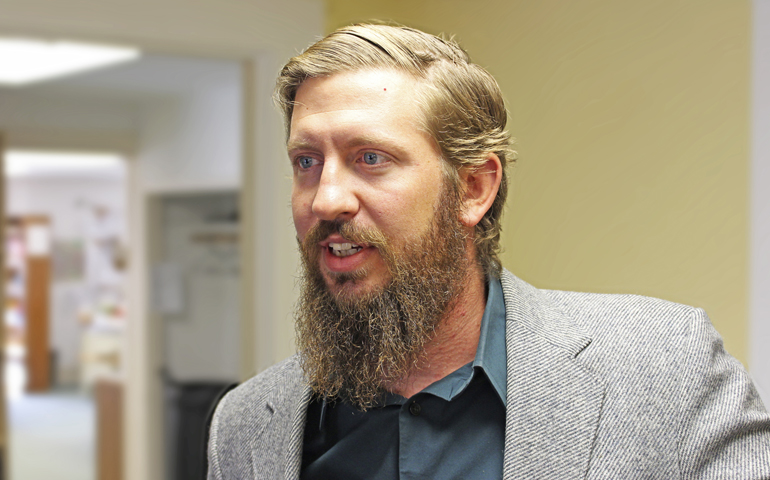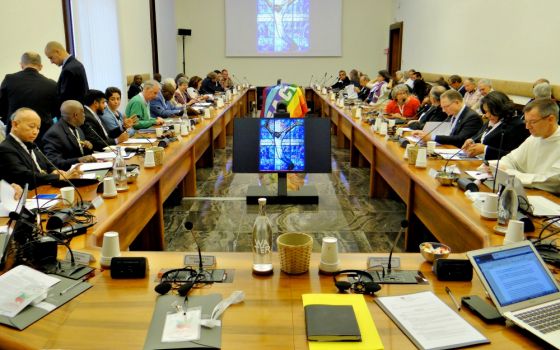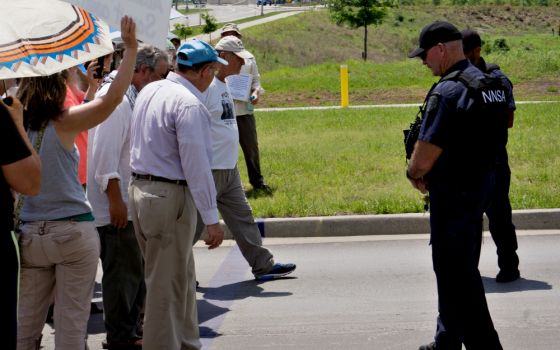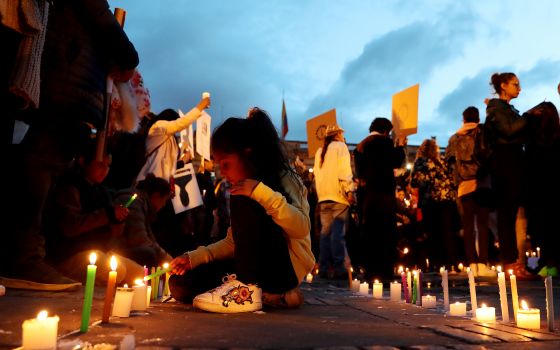
James Gillcrist: Even before he went to Iraq, "it wasn't clear that we could succeed at anything." (NCR/Toni-Ann Ortiz)
In spring of 2001, the path to the future seemed as straight and predictable for James Gillcrist as the lines of a military parade.
The son of devout Catholics, he was headed for West Point, following a long family history of military service. One of his father's cousins had graduated from West Point, another "handful of Gillcrists" had graduated from the U.S. Naval Academy. His paternal grandfather had been an officer in the U.S. Marine Corps. Three of his uncles were officers — a Navy pilot, a Marine Corps pilot and a Navy diver. An older brother (he also has two sisters) would deploy to Iraq in 2003 and spend 15 months there.
The military culture is so much a part of this family's history that they had a special coin minted. One side bears the names of all the wars in which family members participated — from World War I, World War II, Korea, Vietnam, the Gulf War, and the operations in Afghanistan and Iraq. It also bears the seals and mottos of the Army, Navy and Marine Corps. On the other side is the family coat of arms surrounded by the terms: wisdom, loyalty, courage, faith, strength, authority and crusader.
It was against that backdrop that the fresh graduate of St. Thomas Aquinas High School in Overland Park, Kan. — blocked by color blindness from his original ambition to become a fighter pilot — headed off to the U.S. Military Academy.
The straight path that seemed to stretch out before the young Gillcrist would eventually resemble a quite unpredictable journey full of curves and switchbacks. Fourteen years later, Gillcrist would show up for one of a series of interviews, now a doctoral candidate in philosophy specializing in military ethics and the just war tradition, wearing a blue T-shirt with an announcement in big block letters: VETERAN AGAINST THE WAR.
Hours of conversation revealed, however, that nothing about this relentlessly curious man could be reduced to a slogan. At age 34 and influenced by the distilling disillusionment that attended his deployment in the last phases of the Iraq War, he holds thickly textured ideas about God, country and service. The T-shirt legend would more correctly be modified by "some" or "most" wars.
To hear him describe it, the opening weeks at West Point in New York in the summer of 2001 were a lark. He loved the summer training at Lake Frederick, a two-week block spent in the wilderness. Families traditionally get to be on the post following summer training, and his parents, John and Teresa Gillcrist, visited. His mother asked him: "Did it rain while you were out at Lake Frederick?" It had rained almost every night, he said.
"Oh, no," he recalls her reply. "That means your class is going to war."

Both sides of the coin minted with the Gillcrist family's military history (NCR/Toni-Ann Ortiz)
She had read, he said, a number of books about West Point and had heard the lore that if a class got rained on at Lake Frederick, it would go to war.
There appear to be numerous versions of that tale having to do with rain falling as a bad omen either at the beginning or end of one's education at West Point. Gillcrist never got to the end. But on the day his mother informed him of the prediction, he thought it absurd.
"We're not going to have another major war for another 30 years," he told her. "The Soviet Union had fallen; we just had the Iraq War. Nobody's going to mess with the United States," went his thinking. "That's absurd." Three weeks later, jet planes flew into the Twin Towers "and the whole world changes," he said.
Next stop: ROTC

At West Point, Gillcrist piled up "hours," an informal term for the punishment that is given for infractions of rules and regulations that must be walked off before graduation. He accumulated upward of a career's worth in his first year and decided he'd be better off leaving voluntarily before they kicked him out.
He landed next in the Army's Reserve Officer Training Corps program at the University of Tennessee as an engineering major. He loved engineering and ROTC but not the fact that he was spending all of his time with men. He switched to accounting. He hated that, too, but persisted because there were a lot of women in the courses.
The academic benefit he found in elective classes in literature and in discussions of ideas stayed with him. He graduated with a degree that he vowed never to use, new curiosity in other disciplines, and a predictable path, once again, toward a military career.
The ROTC scholarship required four years of service. After graduation, commissioned as a second lieutenant, he went to Fort Benning, Ga., for Ranger school and then on the Fort Riley, Kan., close to home, as an infantry officer. He loved the military routine and the work. "It was a great life for a young guy. I loved the guys, my fellow officers," and he "began really thinking I could do a career like this."
"Then we deployed in 2009, and that's where I realized I can't do a career in this."
Gillcrist was supposed to deploy to Afghanistan. He felt a bit of relief about the assignment because at the time he thought "that was the good war. Iraq is the bad war. It seemed, at least on the surface, that there was justification. We were attacked by people from Afghanistan."
The orders changed three months prior to deployment. They would be going to Iraq. "Then most of us would spend most of our time in bars in Manhattan [Kan.] or in coffee shops in Manhattan trying to, like, figure out why we were going to Iraq. By that time, it seemed very clear to us that it wasn't clear that it was justified. It wasn't clear that we could succeed at anything. So, we had a lot of these questions."
His good friend Jeremy Dunnaback, who went through officer training and deployment to Iraq with Gillcrist, recalls his friend as the one with the most persistent questions.
"I think that Jim was a little bit more the one to question, especially with those in our command structure and with commanding officers," he said. "Jim needs a good reason, he wants to believe in something, and I think at times it's hard to see the end product, especially in Iraq."
However, even Gillcrist at some point had to put aside the questions and move on, trusting that "maybe we just don't have all the information, maybe there is a justification."
Deployed to Iraq
That trust began to erode soon after arriving in country. From September 2009 through the following July, he was "chief of operations — captain" of the Second Battalion, 16th Infantry Regiment in al-Siniyah, Iraq, "responsible for all administrative logistics operations of the battalion" and "for integrating and synchronizing all available assets and combat enablers to support company missions." In other words, he was aware of everything going out and coming back in to headquarters and responsible for filing reports on it all for his commanding officer.
The period was "post-surge," the strategy advanced two years prior in an attempt to stop the sectarian violence that had been raging and to reconcile Sunnis, Shiites and Kurds. Endless interpretations exist, of course, about the validity of the strategy, whether it was an utter failure, a great success or still working itself out now through the Iraqi army campaign against the so-called Islamic State.
In that moment of 2009, however, what Gillcrist perceived was a strategy that was unsustainable. In his view, it essentially armed Sunni insurgents and then paid them not to fight U.S. troops. The reformed insurgents were to arm checkpoints and perform other security duties, he said, but they rarely showed up, even though they continued to collect payments.
"I remember thinking at this point, 'This doesn't seem like a sustainable solution, especially since in 2009 we knew we were leaving Iraq in 2010, at the latest, 2011.' It seemed that this whole system was not that these people bought into the government of Iraq but that they were doing this for payment. Once that payment goes away, this place is going to devolve very quickly. And it did."
Early on, he also attended a meeting between U.S. military brass and members of the council in the city of Beyji.
"Aside from the members on the council, the people in Beyji lived without plumbing, without electricity, in hovel shacks with, like, literal shit trenches outside their door. And it's where one of the largest oil refineries in the Middle East is. So, the people who run it are all just incredibly wealthy, and of course the persons who are also the political heads of this little community. … They're not dealing with lack of plumbing, lack of electricity, lack of schools. They didn't care about the people that were. They wanted a library, which for a town where most people were illiterate seems an absurd use of money."
But he quickly found out, when the time came to write up the report for his superior, the precise adherence to the truth wasn't a strict requirement. In fact, his first detailed report of the event was turned back, he said, with the message, "You can't write any of this. Change it."
Dunnaback, who remained in the same battalion with Gillcrist but served at the time in a different company, holds a less critical opinion.
"Well, you know, Jim has more of a 50,000-foot view of that from his position." Issuing payments to the insurgents "was widely advertised as a kind of turning point for the surge," he said. "Many of the Sunni tribesmen felt disenfranchised since the early part of the Iraq War. Whom do they turn to? Is it the Shia population that they have a contentious relationship with or the Sunni insurgents who have come into the area, or married into the family, or taken over areas by force?"
Dunnaback, who went to law school after leaving the service, is now an associate attorney for Chicago law firm Jenner & Block and remains a close friend and someone Gillcrist regularly consults when puzzling through ethical problems involving the military. The lawyer said his understanding of the U.S. Army's thinking was " 'Give them a stake in the game, the payment helped to turn the tide' to keep al-Qaeda in Iraq from returning to areas of Iraq once they had moved them out. … I can understand the Army wanting to keep giving them a stake in the game and train them eventually to take over."
Gillcrist said, however, that the mood about the daily reports changed one day after a meeting with the council in Beyji. It was apparent that U.S. soldiers had been set up by Iraqis to get shot at by a passing Toyota truck carrying armed insurgents. After that, his commanding officer wanted full details reported because "nothing was working." But it was just months before they started handing over their forward operating base to Iraqis in preparation for leaving.
Kant in a war zone

At one point during a phone interview, Dunnaback described Gillcrist as "probably one of the most naturally curious people I've seen," and inclined "to challenge" prevailing assumptions.
Gillcrist also turned the challenges, at least intellectual challenges, on himself. It is probably a safe bet that few of those deployed to Iraq at the time were receiving Amazon deliveries of such weighty material as Immanuel Kant's Religion Within the Limits of Mere Reason.
He explains what really struck him: "So Kant has this argument where he says, 'Look, if there is a god that will pass judgment, then he is passing judgment on whether or not you do your duty or fail to do your duty.' Kant says that because there is no supererogation, because you can never go above and beyond your duty, if you ever fail to do your duty, you incur this debt, and you can never pay it off."
Whether that interpretation of the 18th-century religion philosopher would move other mortals to a life decision is an open question, but as Gillcrist explained: "That had an incredibly powerful effect on me. … I read that, and I was just taken aback and looking out and thinking, 'I don't think I can justify most of this,' " referring to the war and his military career.
He spoke to his superior, who was quite understanding and asked if he could continue to do another type of work until his deployment ended. Gillcrist agreed and knew that his military career path had finally ended.
Re-entry to civilian life was tough at first. People, well-intended and concerned, were asking him questions, "and I don't yet have my own narrative of what happened. And so these questions are even more stressful, and very quickly I wanted to get away from those questions. I also had the urge to do something good, and so I started talking to a family friend of ours who was a priest and from India. I told him I can't stay here; I can't stay in America. I want to do something good. And he said, 'Why don't you go to India?' "
So he did, with his then-fiancée, Gina Zanolli, who coincidentally was working on a master's thesis on developmental aid and its effect in India. They spent four months living with the priest's family, helping build an orphanage and also teaching English in the village school.
It worked. He remembers India fondly as "just an incredibly, relaxing, beautiful country."
Back in the States, he went to Seattle to be with Gina, now his wife, as she completed her graduate work at the University of Washington. "And then it was, 'What am I going to do with my life?' "
Zanolli, who knew his growing interests lay far from the area of accountancy, urged him to apply to do graduate work in philosophy. He did, even though he had never taken a philosophy course. He applied to 10 programs, got rejected by nine, and was about to head off with Zanolli to new jobs in Washington, D.C. (she to a nonprofit, he as an aide on a Senate committee), when his mother called from Kansas, saying he had received a letter from Boston University. He told her to ignore it because it was just another rejection. She opened it instead and informed him that he had been accepted.
A modified Pascal's Wager

Zanolli insisted they upend their plans and go to Boston, where he was eventually invited, because of his interest and experience in Iraq, to take a course that combined politics and philosophy on the ethics of force.
That's when he started reading just war theory and attempting to apply it to contemporary issues. "I found there's a lot of people writing stuff about just war theory today that I really find problematic. And that was it." He was caught up for good in the enormous questions of war and peace.
His adviser pushed him to continue working in that arena, particularly because of his perspective as a former soldier. That pursuit led the couple back to his home state and the University of Kansas, where, he explained, he was attracted to the work of two professors in the philosophy department. One of them, he said, "still deals in the currency of rights and natural rights, but doesn't try to ground it in any theories about the divine, so we can talk about rights in a secular way, and another who works in applied political ethics, from the economy to just war theory, and grounds it in a feminist perspective."
His ideas about God, spoken during a car ride and later transmitted in brief form in an email, have little to do with the relational understanding of God he probably heard about during his years in Catholic school. Now in a relationship with the church that he describes as "complicated," he explains belief in what he terms a "modified Pascal's Wager," in which belief is a rather transactional affair.
Most simply put, it's a bet that belief in a God of justice, even mercy, and acting on that belief, is the most promising wager and will possibly end up in rewards in the next life.
His research has produced such complex articles as "The Right to Life and Military Ethics," a long essay arguing against a central point in Michael Walzer's Just and Unjust Wars (a formative book in Gillcrist's interest in the ethics of war and peace), in which the author posits that soldiers, simply by virtue of fighting, "have lost their title to life and liberty."
In another, briefer piece, he argues a narrow line of thought, while conceding that Army Sgt. Bowe Bergdahl was guilty of desertion and misbehavior before the enemy, against the charge of treason.
And with Nick Lloyd of the University of Illinois at Chicago, a combat veteran and infantry captain who served in Afghanistan, Gillcrist co-authored a paper titled, "Moral Injury, Mission Drift, and Limited War," an extended examination of whether limited wars can be just, what circumstances constitute imminent threats, the usual result of extended wars, and the consequences — moral wounding — that occurs when the justification for a war is not clear to combatants.
His view of war has changed considerably. He's not an absolute pacifist, believing "there is in some ways some intuitive incoherence to pacifism" because it "commits you to not just saying, 'I wouldn't do this,' but I think it actually commits you to saying 'others ought not do this.' "
He raises the example of a woman who is being raped and pacifism saying she should not stab her assailant: "It's one thing to say, 'If I'm being raped, I wouldn't,' and another thing to say, 'If you're being raped, you shouldn't.' "
But in his current thinking, violence is tolerable only in the most extreme circumstances. He goes considerably against the grain in thinking that the first step in the "ongoing engagement against … non-state groups that use force to try to persuade and gain control" should be a willingness to negotiate.
"We must be willing to say we're willing to sit down with you." If we don't, he said, and they have any legitimate complaint, we have "closed off using reason and discourse" to head off violence. "Unfortunately, if anyone raises that as a first step in the political arena as it exists today, they get labeled as weak instead of right."
He is in the middle of a dissertation with the working title "On Liability, Coercion, and the Moral Status of Combatants: A Rejection of the Combatant/Noncombatant Distinction" and is teaching a course on moral issues in warfare.
His path seems to have led him, once more, to a predictable stage. He loves to research and teach.
Though he admits that the conversation at times with his family can be strained, he has carried on the tradition — an officer, a combat veteran, as much a part of the family coin as those who've gone before him and those who may come after. If he had his way he might add one more "virtue," in the form of a command, to the list of terms on the coin: Question!
[Tom Roberts is NCR editor at large.]








